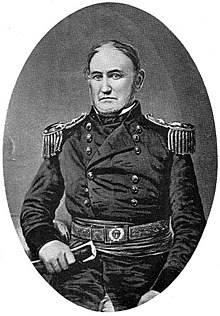David Twiggs
David Emanuel Twiggs (* 1790 in Richmond County , Georgia , † July 15, 1862 in Augusta , Georgia) was an American soldier during the British-American and Mexican-American Wars and a general in the Confederate Army during the American Civil War .
Career
David Emanuel Twiggs, son of John Twiggs , a Georgia Militia general during the American Revolutionary War , and nephew of David Emanuel , Georgia governor and the first Jewish governor in the United States, was on the Good Hope Estate in Richmond County, Georgia born. David made an early decision to pursue a military career when he volunteered for military service in the British-American War. He then served in the Seminole and Black Hawk war .
When the Mexican-American War broke out, he was Colonel of the 2nd Cavalry Regiment . He led a brigade of the Army of Occupation in the battles of Palo Alto and Resaca de la Palma . Then he was promoted to brigadier general and commanded a division at the Battle of Monterrey . He took part in the Winfield Scott Expedition, where he commanded the regular 2nd Division and led it in all battles from Veracruz to Mexico City . He was also wounded in the attack on Chapultepec . After the fall of Mexico City , he was appointed military governor of Veracruz . On March 2, 1847, Twiggs was awarded a sword of honor by Congress . The sword was found after the conquest of New Orleans in 1862 and returned to Twigg's family in 1889.
After the Mexican-American War, Twiggs received a major general certification and commanded the Department of Texas . He was in command there when the American Civil War broke out. Twigg's command included over 20% of the US Army guarding the border between the United States and Mexico . As the states began to secede , Twiggs met with three Confederate commissioners, including Philip N. Luckett and Samuel A. Maverick , and gave them all of his command. At the time of his handover, Twiggs was in San Antonio with nearly 200 Union soldiers , the rest of his troops were scattered along the border. A 2,000-strong secessionist militia arrived in the city, determined to capture the Union arsenal there. Outnumbered, five to one, Twiggs gave up on February 19, 1861. Thereupon Twiggs was discharged from the US Army for high treason and accepted an officer license as Major General from the Confederate States . He was appointed commander of the Confederate Department of Louisiana , but his advanced age prevented him from actively commanding, so he resigned on October 11, 1861. He died of pneumonia in Augusta in 1862 and was then buried at "Good Hope".
literature
- Eicher, John H., & Eicher, David J., Civil War High Commands , Stanford University Press, 2001, ISBN 0-8047-3641-3 .
Web links
- David Twiggs in the database of Find a Grave (English)
- Reenactment of Twiggs's Surrender in San Antonio
| personal data | |
|---|---|
| SURNAME | Twiggs, David |
| ALTERNATIVE NAMES | Twiggs, David Emanuel |
| BRIEF DESCRIPTION | General of the US Army and the Confederate Army |
| DATE OF BIRTH | 1790 |
| PLACE OF BIRTH | Richmond County , Georgia |
| DATE OF DEATH | July 15, 1862 |
| Place of death | Augusta , Georgia |
